Average sizes and life expectancy for this breed:
Hailing from the Berne region of Switzerland, Bernese Mountain Dogs are highly prized as family pets and versatile working dogs. They are one of four Sennenhund-type breeds that can trace their ancestry back to Roman Mastiff dogs. All these breeds have distinct black and tan coats with white markings that represent the cross on the Swiss flag for many people. These striking, large dogs are known to be true gentle giants, especially around children. Moreover, they are known to be affectionate, loyal, and intelligent, which means they are relatively easy to train. These robust, hard-working dogs are also well suited to compete in a range of dog sports including tracking, obedience, herding, carting, and conformation competitions. They are generally known to be calm and agreeable dogs; however, you must ensure you have the time to devote to their exercise and mental stimulation needs for them to remain happy and content.
Bernese Mountain Dogs can be suitable for first-time dog owners but remember that these dogs get large! So, you must be willing to put the effort into consistent training and exercise. These dogs don’t like being cooped up in small spaces all day and they dislike being left alone for long periods. Moreover, they are known to shed and drool excessively. However, for the right owners who understand their unique needs, these beautiful dogs make wonderful, devoted, sweet-natured companions that will attract attention wherever they go.
With ample open space, regular grooming, and a consistent training routine, the Bernese Mountain Dog will show devotion, loyalty, and unconditional love to their owners.
See available puppies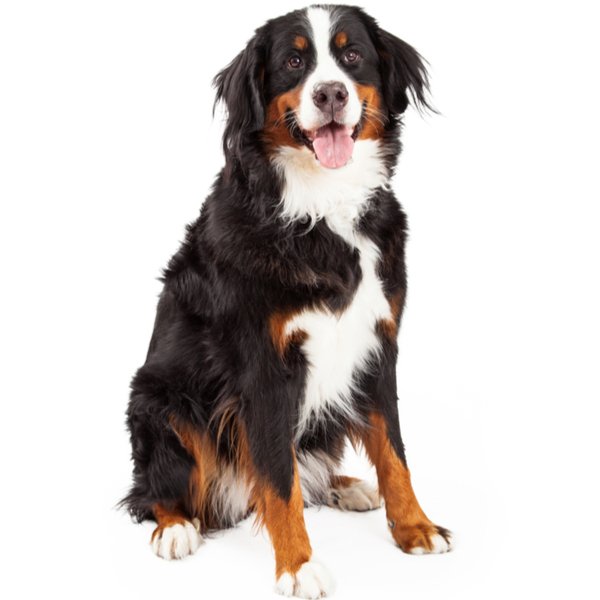

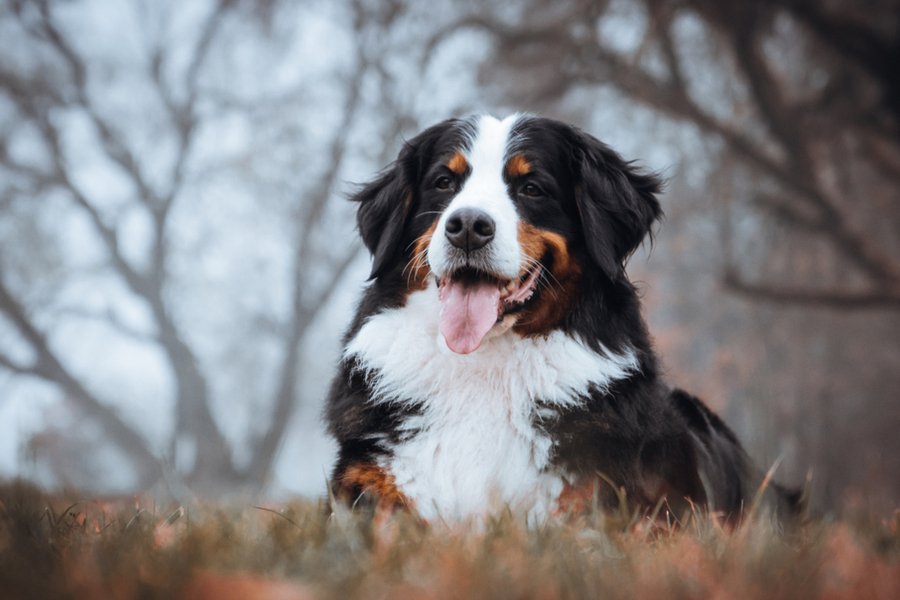


Bernese Mountain Dogs are believed to have an ancestry that dates back to Roman times. Their ancestors arrived in Switzerland more than 2,000 years ago, where they were utilised as all-purpose farm dogs. Some of their jobs included pulling dairy carts. herding livestock, and protecting farms, as well as devoted canine companions. Thanks to their thick, double-coats, these dogs were perfectly designed for the cold weather in the Alps.
The Bernese Mountain Dog belongs to a group of dogs called “Sennenhund”, of which they are the second largest among the other three types; the Entlebucher (the smallest) the Appenzeller, and the Great Swiss Mountain Dog, which is the largest of them all. The word ‘Sennenhund’ roughly translates to ‘dog of the Senn’, named because they accompanied Alpine herders and dairymen known as ‘Senn’ or ‘Senner’.
At the turn of the 20th Century, more and more breeders became interested in searching for old, native Swiss breeds. In particular, Dr. Albert Heim was a huge admirer of the Bernese Mountain Dog. In fact, he is often credited for preserving the Berne Sennerhund as a distinct breed, and it’s thanks to his dedication that we have the handsome, devoted breed we know and love today.
During the mid-1800s, these dogs fell out of favour as machines had been developed that could carry out their jobs more efficiently. However, devoted breeders and enthusiasts formed breed clubs to ensure the survival of the Bernese Mountain Dog. From this time, they were more often utilised in dog shows and sports competitions.
The Bernese Mountain Dog first arrived in America in 1936, with the import of a male and female from Switzerland. The breed was recognised by the American Kennel Club in 1937 and has steadily gained in popularity since then. The Bernese Mountain Dog Club of America was formed in 1968.
Breeders began importing these dogs into the UK in the mid-1930s. However, breeding programs were halted during World War II. They resumed after the war ended in 1945. The Bernese Mountain Dog Club of Great Britain was formed in 1971 and the breed has built up a community of devoted breeders and loving owners since then.
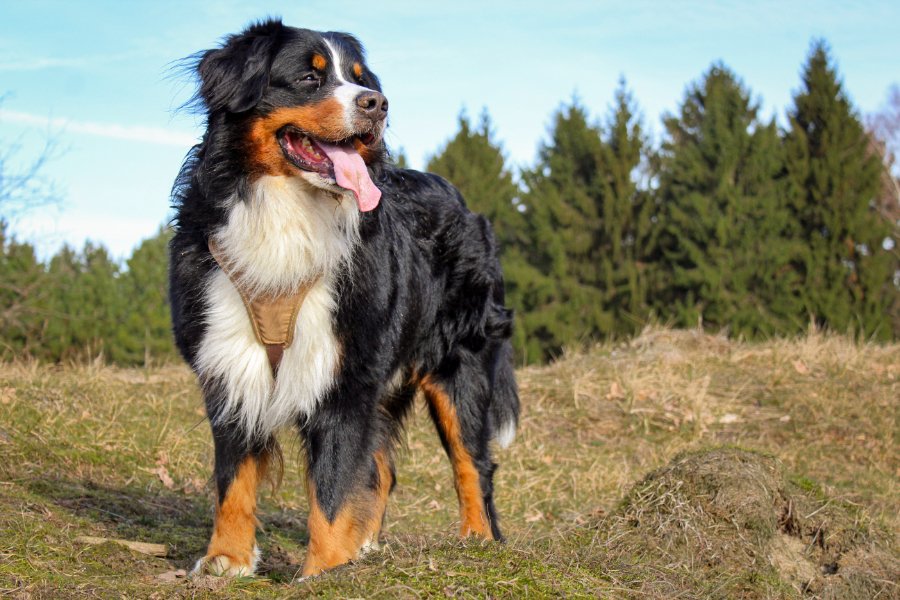
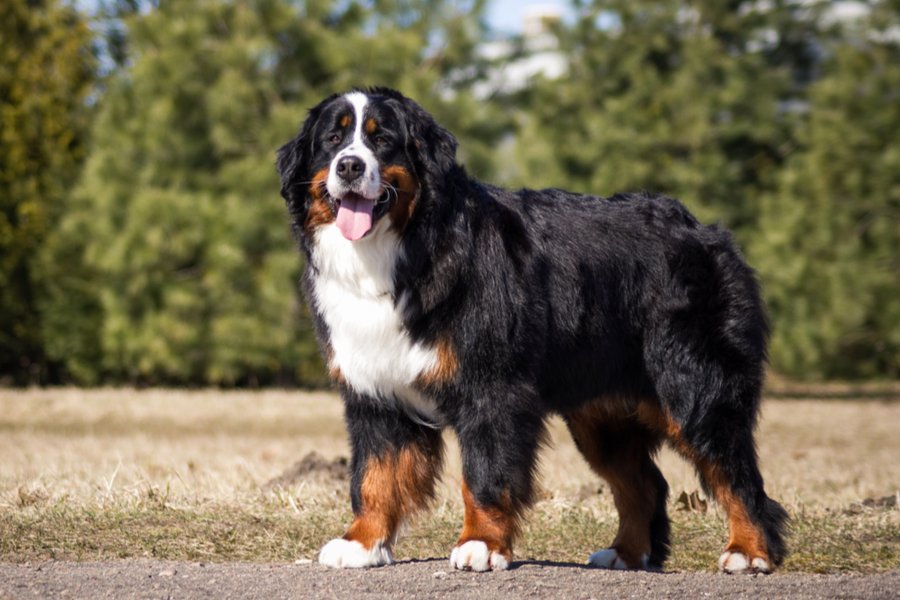
The Bernese Mountain dog is a large, striking dog breed, that is sturdy, robust, and well-boned. This impressive build, alongside their gorgeous tricolour coats, really makes these loving dogs stand out from the crowd.
Bernese Mountain Dogs have strong, flat skulls with well-defined stops over their straight muzzles. Their almond-shaped eyes are dark brown in colour and they have medium-sized ears that are triangular and set high on the head. Their ears are held slightly forward when they are excited or alert, but lie flat when they are relaxed.
These dogs have a strong jawline with a perfect scissor bite. Their muscular necks are medium in length and highly muscled. Their forequarters are long, with sloping shoulders and upper arms that form a distinct angle. Furthermore, these dogs have fairly compact bodies with deep, broad chests and well-defined ribcages. They have powerful loins, firm and level backs, with a smooth, well-rounded rear.
The Bernese Mountain Dog’s well-muscled hindquarters are broad and strong and their back legs are well-developed. Their feet are short, round, and compact. These dogs have bushy tails that are raised when the dog is alert or working but should never curl over the back.
Bernese Mountain Dogs have a medium-length coat that is soft and silky with a natural sheen to it. Their hair is fairly long and somewhat wavy but never curly. These dogs have an attractive coat that is jet black, with reddish markings over the eyes, on the cheeks, chest, and all four legs. These dogs also have a striking white blaze on the head and white markings on the chest. Some dogs may have white paws, and some may not; both are acceptable as a breed standard. The only recognised breed colour by the Kennel Club is tricolour.
An affectionate, alert, and intelligent canine, the Bernese Mountain Dog is a real pleasure to be around. They are calm, gentle, and tolerant animals that adore being with their families. They love to be involved in every activity in the home and they have a sweet playful streak which makes them wonderful companions for children. However, remember that these are very large dogs that mature slowly compared to many other breeds. In fact, they will often reach full size before they reach mental maturity. For this reason, consistent training from puppyhood is essential to make sure they know what is expected of them.
Bernese Mountain Dogs are naturally protective of their families, but they are not aggressive. They are generally peaceful and sociable; however, they may be aloof and defensive around people and dogs they are unfamiliar with, especially other male dogs. Start to expose them to other animals, places, and people from a young age, because this will help them to become more accepting as adults. These dogs need consistent training and soclialisation to overcome their natural shyness.
Bernese Mountains dogs may be large, but they are not particularly high-energy. A couple of 30-minute walks a day is ideal, as well as some playtime in the garden when they are in the mood, When they are not exercising, these dogs are known to be very relaxed and chilled in the home. The most important thing is that they are surrounded by the people they love and feel comfortable with.
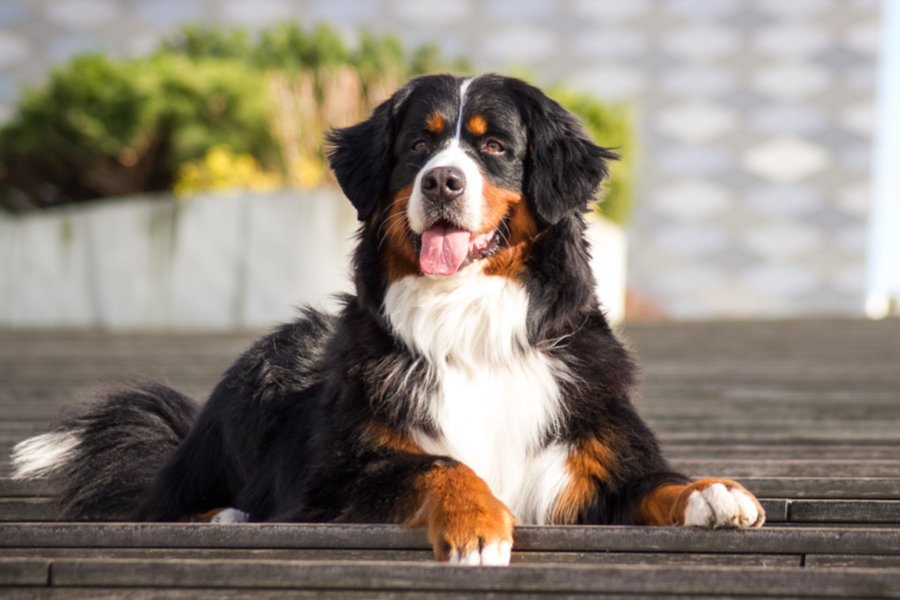
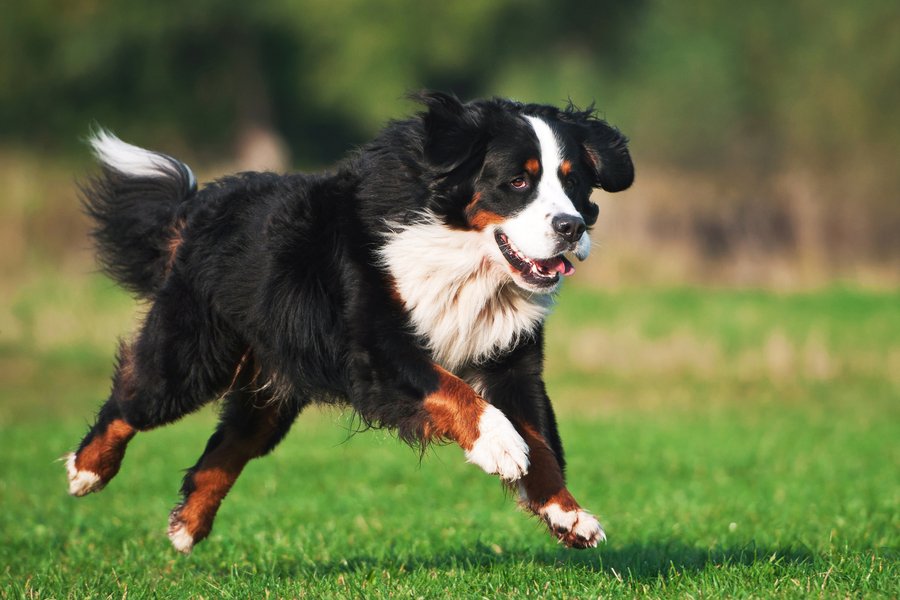
Their intelligence and eagerness to please mean Bernese Mountain Dogs are pretty easy to train. However, their training and socialisation must start early for best results. Positive reinforcement training is the best method to use with these dogs because they are known to be highly sensitive by nature and so they do not respond well to harsh training methods. In the beginning, keep training sessions short and fun to make sure your dog remains engaged, and don’t forget to reward them for good behaviour. Attention, fuss, or a bit of playtime are all good reward options, as well as treats. Just make sure you don’t offer too many fatty treats because these dogs are prone to weight gain. Treat your Bernese Mountain Dog with respect, love, and patience, and you will be rewarded with a devoted companion.
Bernese Mountain Dogs are beautiful but they can be high maintenance in the grooming department as they have long coats that shed excessively, especially in Spring and Autumn. To reduce the amount of hair around the house and keep their coats clean, tangle-free, and healthy, these dogs require a thorough brush several times a week with a double-sided pin brush or slicker brush that will get right down into the fluffy undercoat. Perhaps the easiest way to groom your Bernese Mountain Dog is by brushing the coat in small sections, divided into layers. This way, you can ensure you don’t miss any areas.
Bathing can be done every three months or so to maintain their clean appearance, unless they get especially muddy or dirty!
Daily dental hygiene is the best way to prevent tooth and gum disease and bad breath. However, twice a week brushing is enough to avoid any bacteria and tartar from building up. Ask your vet what dental products are the most suitable to clean your dog’s teeth, gums, mouth, and tongue effectively.
Their ears must be examined frequently for any signs of infection or wax build-up. These can include excessive scratching, head tilting, redness, and swelling. You can clean their ears weekly using a soaked cotton wool ball and an appropriate ear cleaner.
Their nails can be trimmed once or twice a month or as needed to keep them healthy and in tiptop condition. Make sure that you do this often to avoid very long nails that can be painful and awkward for your Bernese Mountain Dog. While you do this, check their paw pads are injury and dirt-free.
Furthermore, inspect the whole body as you groom and clean your dog to check for any inflammations, wounds, rashes, and other indicators that they may have an infection or illness. By getting into a routine of doing this regularly, you will be able to pick up on any potential health conditions early on. Your Bernese Mountain Dog’s eyes must be clear, clean, and healthy without any inflammation, redness, swelling, or discharge.
Introduce grooming to your puppy as early as possible to help them get used to the routine. Make it a part of their training and don’t forget to use positive reinforcement methods.
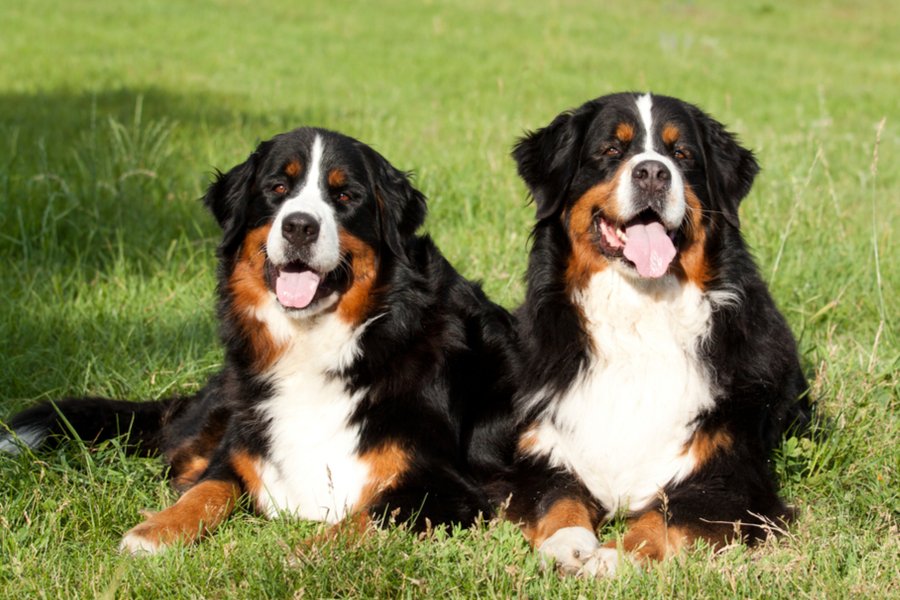
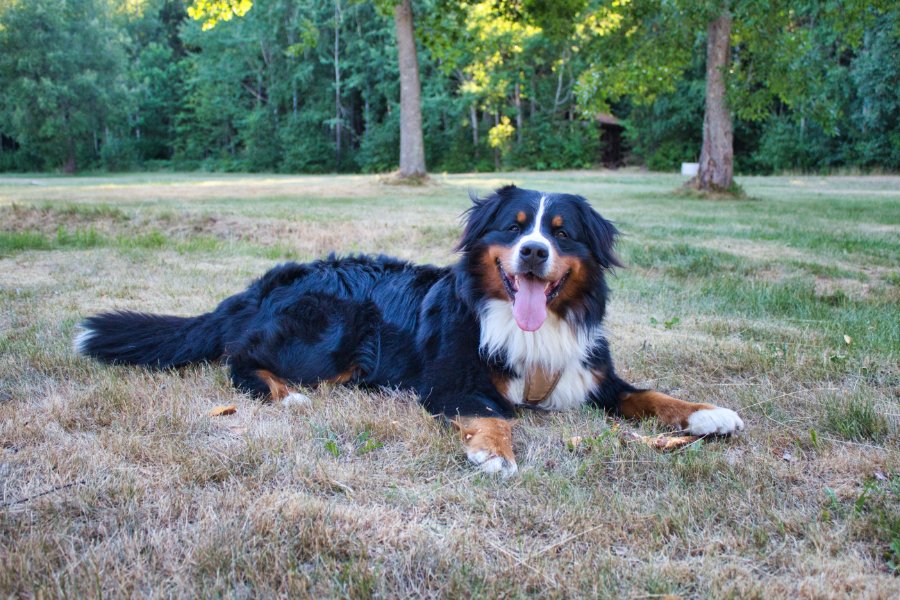
The Bernese Mountain Dog has a fairly short life expectancy of 6-9 years. While they are a robust breed, they are prone to developing a number of health conditions, especially cancer. For this reason, it’s essential that you do your research and only purchase puppies from reputable breeders that will be able to perform DNA tests to check for any detrimental health predispositions.
The Bernese Mountain Dog is prone to developing a variety of health issues that you need to be aware of, including:
As mentioned, these large dogs are known to be real gentle giants. They are also placid, calm, and thrive in human company which makes them great companions for children. However, due to their sheer size, it is best to supervise every interaction between a Bernese Mountain Dog and a child to prevent any incidents and injuries.
The Bernese Mountain Dog generally tolerates other animals in the home if they have grown up together, including cats. However, remember that early socialisation is essential to ensure your dog grows up to be obedient, well-rounded, confident, and gentle. Be aware that these canines can be wary of unfamiliar dogs, especially males, so it’s best to keep your dog on a lead until fully trained.
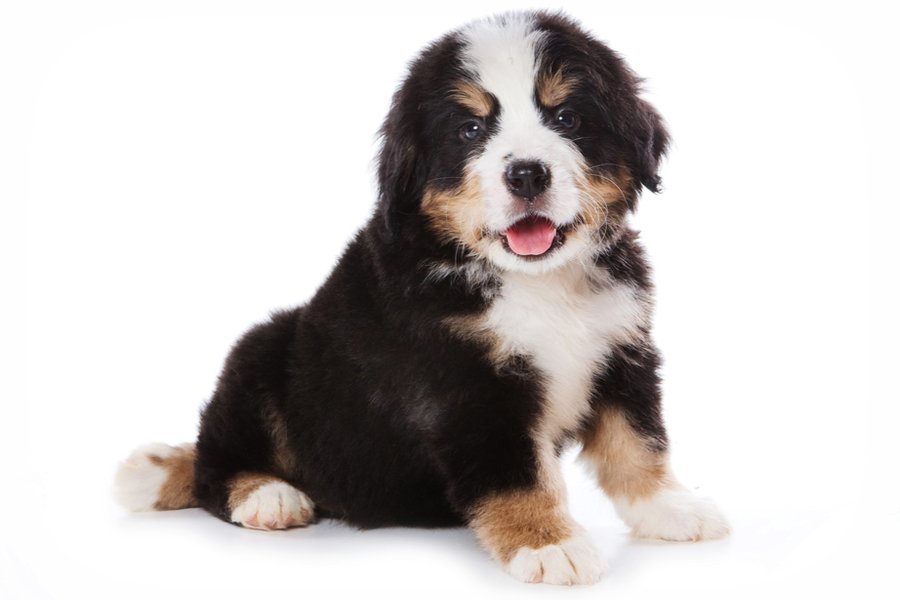
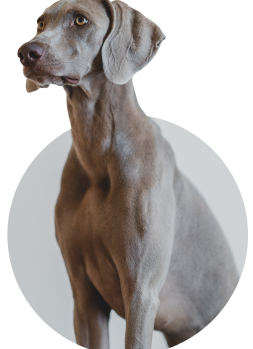
We can connect you with Breeders that are specialized in this particular breed.
See available puppies

Need some advice?
Whether you're a first time pet owner, an experienced pet owner, a new or long-time breeder, or just curious about pets, we've got you covered!
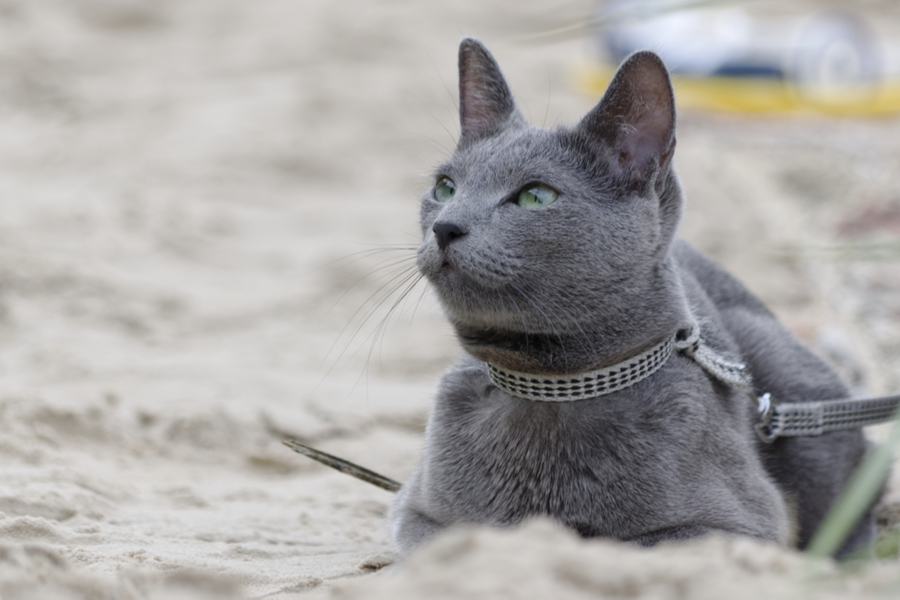
January 17, 2024
What Is The Personality Of Russian Blue Cats?
Russian Blue cats are most known for their distinctive shimmery blue-silver coat and piercing green eyes. However, this breed’s calm and gentle temperament is what makes them shine the most in the feline world.
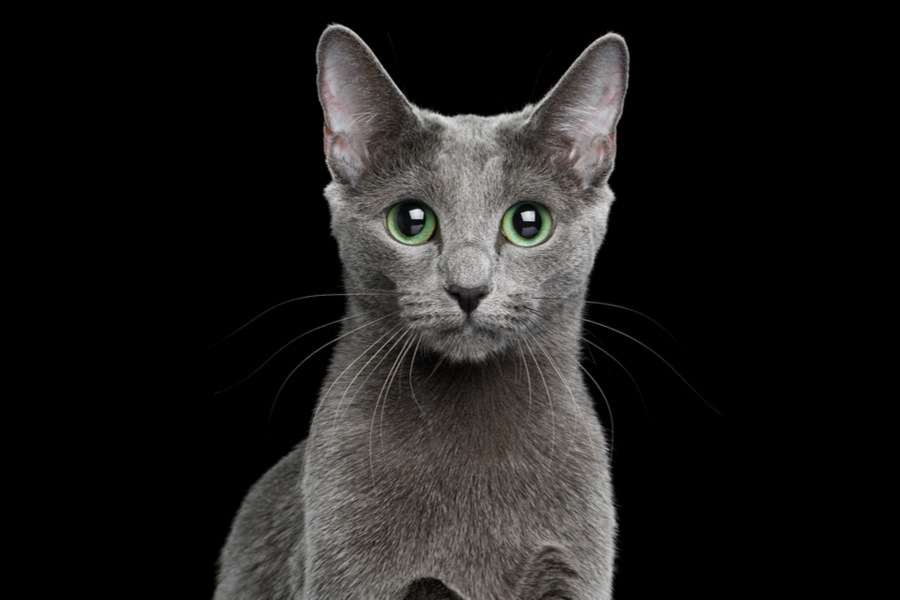
January 17, 2024
10 Facts About Russian Blue Cat Breed
Russian Blues are one of the most aesthetically stunning cat breeds, with a gorgeous plush silvery coat and vibrant green eyes. However, it’s not only their appearance that is beautiful; their nature is too.

January 17, 2024
How To Choose The Right Cat Breed for You
Cats can make the most fantastic animal companions; they are adorable, friendly, and loving. However, not all felines are created equal. There are many different breeds, of which each has its unique personality traits.
Need some help?
Contact us to speak to our friendly advisor, who will gladly help you find your dream pet!



We are registered in England and Wales under registration number 12568840,
and our registered office is at 58-60 Kensington Church Street, W8 4DB London, England.
© 2023 The Pedigree Paws